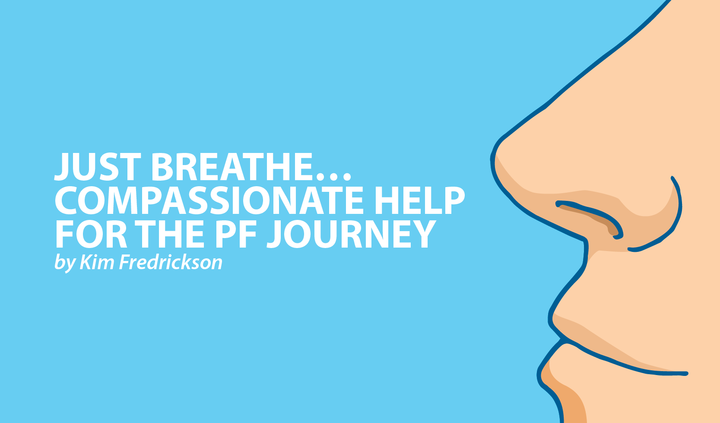Give Yourself Time to Adjust on the PF Journey
Written by |

There is so much to adjust to when you’ve been diagnosed with pulmonary fibrosis.
For me the biggest adjustment has been the diagnosis itself, with it’s dismal future. Then there’s medical tests, oxygen, tiredness, change in functioning at home and work, grief, and a lot more. Giving myself time to adjust to all these transitions has been very important.
 About six months ago I was speaking at my retirement party put on by Western Seminary, Sacramento, Calif. They hosted this lovely party for area therapists and my past students. I had the privilege to teach Masters level students at Western Seminary for 15 years. Besides this wonderful celebration, it gave me a venue to sell 30 years worth of counseling materials (books, art therapy, play therapy, office decor, past workshops, and a lot more). It was a wonderful day. I felt loved, honored and celebrated by more than 50 therapists and prior students.
About six months ago I was speaking at my retirement party put on by Western Seminary, Sacramento, Calif. They hosted this lovely party for area therapists and my past students. I had the privilege to teach Masters level students at Western Seminary for 15 years. Besides this wonderful celebration, it gave me a venue to sell 30 years worth of counseling materials (books, art therapy, play therapy, office decor, past workshops, and a lot more). It was a wonderful day. I felt loved, honored and celebrated by more than 50 therapists and prior students.
I also provided one unit of continuing education for therapists and shared some things I learned during my career as a marriage and family therapist. Toward the end of my presentation I talked about “finishing well” well as a therapist, and the process I went through to close my 30-year practice due to health reasons.
Allow yourself the time you need.
One of the things I mentioned was that I allowed myself to take the time I needed to give up my office completely. I had been subletting it for quite some time before I felt emotionally ready to say goodbye to my lovely office, put my furniture in storage, and end my career with a wonderfully supportive group of therapists. It was hard to do, but made easier because I gave myself the time I needed.
I also gave myself more than a year before I decided I was ready to sell and/or give away the books, DVDs, therapy tools, and training materials I had amassed in 30 years. I couldn’t believe there was so much stuff! It was therapeutic for me to go over each item and remember how each one helped me to help others. It was important to me to know these items were going to be used by other therapists to bring hope and healing into the lives of others.
 This party also gave me a way to raise some money for a new high-flow oxygen concentrator.
This party also gave me a way to raise some money for a new high-flow oxygen concentrator.
It felt good to take care of myself by selling a lot of items to buy that machine. I also was able to offer a good deal to a lot of therapists and “poor” students, and know that these items would continue to be used for healing. I’m happy to tell you I raised enough for the machine plus some, and I am breathing easier because of it.
Many therapists commented to me afterward what an impact it made on them that I gave myself so much time to adjust when our culture doesn’t support that.
The norm is to do quick endings, not pay attention to your feelings, get over any grief you feel right away, and move onto the next thing.
I do believe those are the messages we receive in our society. Most people do not understand the importance of grief and how to process these deep and complicated feelings. Grief is the gift God has given us to say goodbye to someone or something precious to us. We can’t move on to what God has for us without processing grief in healthy ways.
Don’t rush closure if you can help it.
For me, if this retirement party occurred sooner, I would have been overwhelmed by sorrow, and not able to enjoy the day and all the wonderful friends who were there.
Being able to have a celebration with friends was so important for me because my “retirement” was not wanted and was necessitated by my failing health. To have a party and have both the grief and the positives present at the same time was a gift I will always remember. It is helping me come to a healthy place of closure. There were a lot of tears that day by a lot of folks, but they were good tears … of reality, grace, and letting go.
I wanted to share this experience with you in hopes it might help you with the transitions you are going through.
I’m not sure where you are physically and emotionally, and which transitions you are going through. You may be reeling from a recent diagnosis, getting used to oxygen, or trying to find a physician you can trust. You may still be working, or not. You may be in a period of stability with your illness and focusing on living life to the fullest.
No matter where you are, here are a few truths to help you take the time you need to adjust:
- Transitions take time; they are supposed to. This includes physical, emotional, spiritual and relational adjustments.
- Transitions involve lots of very different emotions. It’s normal to be confused, incredibly sad, angry and disoriented — all in five minutes.
- Some people in your life may not be comfortable with the adjustment process. Don’t try to make them understand. Find others who have gone through what you are going through to support you, give you empathy and, when you are ready, help for the future. Other types of support can come through counseling or a pulmonary fibrosis support group in your area.
- God is an expert at grief and transitions, and He completely understands. He doesn’t have you on a timeline. He wants to be one of your support team. He’s the head of my support team. He is faithful to love you through this time.
- Transitions involve grief. You won’t get through them in a healthy way unless you learn to grieve well. (In my next blog post I will share more about the normal cycles of grief and how to navigate them.)
- If circumstances force you to go through a transition quickly, you can go back at your own pace and process it all later. Sometimes life events require making sudden decisions in a crisis. If this happens, you can still give yourself the time and space you need to process the emotions, and do the things you wish you could have done at the time, even if it is a different way.
With time, healthy processing of grief and support, you can get to a new and better place. Even if you can’t imagine it now, even if it seems impossible, it is possible. Don’t give up.
I would love to receive your input.
What stood out to you? How are you helping yourself adjust to life with pulmonary fibrosis? Do you need to give yourself time to grieve or adjust in a particular area? What is one small way you have been (or could be) kind to yourself and give yourself the time you need?
Note: Pulmonary Fibrosis News is strictly a news and information website about the disease. It does not provide medical advice, diagnosis, or treatment. This content is not intended to be a substitute for professional medical advice, diagnosis, or treatment. Always seek the advice of your physician or other qualified health provider with any questions you may have regarding a medical condition. Never disregard professional medical advice or delay in seeking it because of something you have read on this website. The opinions expressed in this column are not those of Pulmonary Fibrosis News, or its parent company, Bionews Services, and are intended to spark discussion about issues pertaining to pulmonary fibrosis.








David Newland
Hi Kim,
My wife Carol has an interstitial lung disease, we belong to the Central Valley Pulmonary Fibrosis Support Group and we meet monthly at Sutter Hospital Sacramento, at the Cancer Center 2800 L St. I am sure we would enjoy getting to meet you. Our coordinator is: Maya Juarez (916) 734-3643 or email [email protected]
Take care. David Newland
Kim Fredrickson
Thanks so much for contacting me David. I visited the group in November, but it was too far for me to come and bring all the O2 I need, I'm on 8 lpm. I was wiped out afterwards. I think I might even have sat next to Carol. It seems like a very nice group, very supportive. Thanks again for reaching out to me.